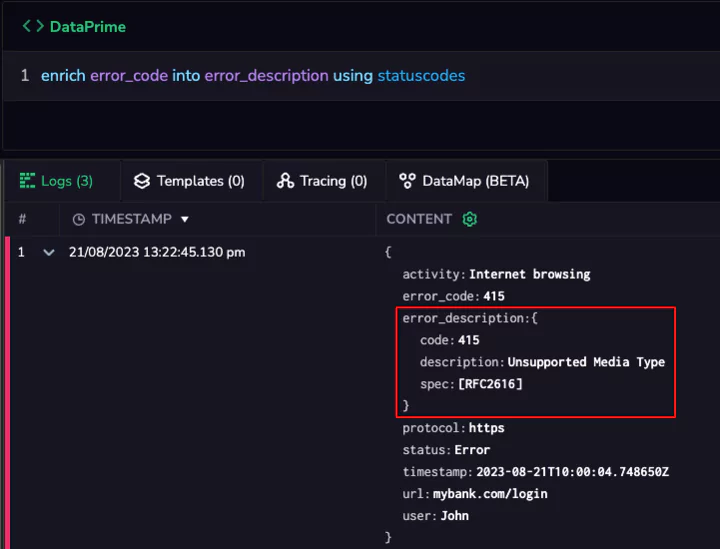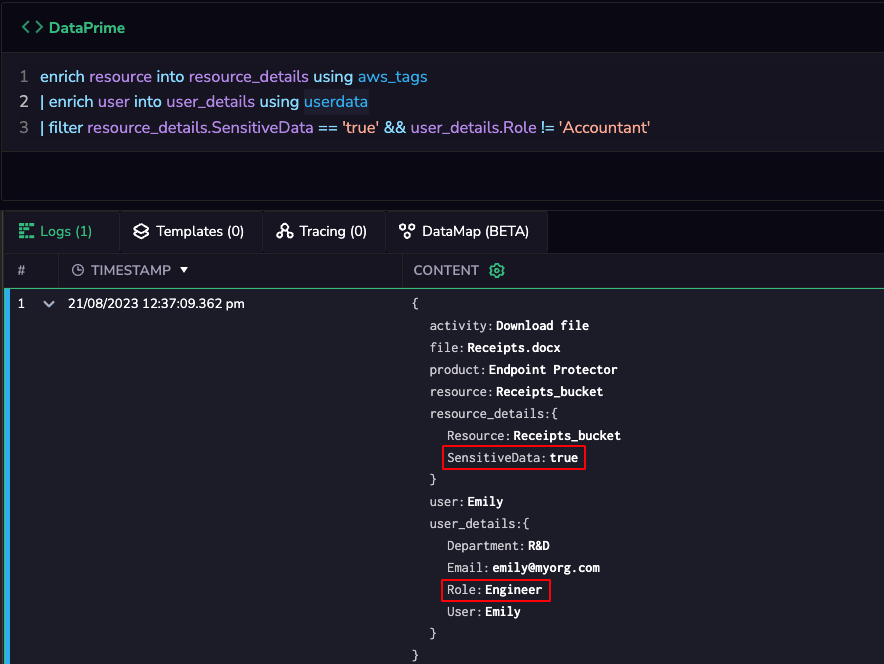Lookup Tables and Log Analysis: Extracting Insight from Logs

Extracting insights from log and security data can be a slow and resource-intensive endeavor, which is unfavorable for our data-driven world.
Fortunately, lookup tables can help accelerate the interpretation of log data, enabling analysts to swiftly make sense of logs and transform them into actionable intelligence.
This article will examine lookup tables and their relationship with log analysis. We’ll explore how lookup tables, in conjunction with a full-stack observability platform, extracts insights from logs, as well as dive into several practical use cases.
What are lookup tables?
A lookup table, or a reference table, is a specific type of data structure used to simplify data lookup operations. Lookup tables contain a set of values or information that can be used to quickly find corresponding values in another dataset.
They are especially useful for mapping one value to another, such as converting a code to a meaningful description. When it comes to log analysis, lookup tables can add relevant context to your logs, enhancing the efficiency, accuracy, and consistency of log analysis. This is particularly valuable when dealing with obscure or unclear log data that requires contextual information for users to understand any given situation and to take appropriate action.
Here’s several use cases where lookup tables can be applied for greater business efficiency and compliance.
Error code interpretation for faster root cause analysis and time to resolution
Logs often contain error codes or status indicators that need interpretation. With lookup tables, you can translate these codes into meaningful explanations to boost your observability, such as
enhanced troubleshooting, reduced downtime and improved system reliability.
Lookup tables also reduce the time and effort required for manual code interpretation. Furthermore, clear error code translations enable quicker time to resolution, leading to lower operational costs and enhanced customer experience.
See example below. For more details and syntax, see our documentation.

Detecting unauthorized access to cloud resources
In cloud environments, multiple users, teams, and applications interact with a diverse range of resources. These resources can include databases, VMs, storage buckets, and more.
Ensuring that only authorized users access specific resources is crucial for maintaining data integrity and security. Detecting unauthorized access quickly is paramount, as it can prevent potential data breaches, financial losses, and reputational damage.
By incorporating information from lookup tables directly into log entries, you can provide analysts with more context, making it easier for them to identify and respond to unauthorized access attempts. For instance, if an analyst is reviewing log entries related to user interactions with cloud resources, the lookup table can bring context on the user role (e.g. based on identity store) and the sensitivity level of the cloud resource (e.g. based on AWS resource tags).
You’ll be able to quickly identify unauthorized access to sensitive data, improve your organization’s security posture and adhere to compliance requirements.
See example below. For more details and syntax, see our documentation.

User behavior profiling for better product development and targeted marketing
Analyzing user behavior through logs can reveal patterns and preferences that guide product development and marketing efforts. Lookup tables can match user IDs with customer profiles, enabling deeper analysis and personalization – without wasting any time searching through extensive databases for each log entry.
By enhancing user behavior understanding, you can develop targeted and cost-effective campaigns while improving customer satisfaction.
Product SKU mapping for better inventory management and increased sales
E-commerce businesses can analyze log data to track product popularity, availability and customer buying patterns. Lookup tables that map SKU codes to product names enable efficient product performance analysis.
With instant access to product names based on SKUs, you can eliminate the need to query product databases repeatedly. As a result, you’ll be able to optimize inventory management, pricing strategies, and marketing campaigns, which can help increase revenue and reduce inventory costs.
Enhanced log analysis with Coralogix Lookup Tables
Coralogix’s next-generation query language, DataPrime provides users with a unique way to describe event transformations and aggregations.
Using DataPrime, map your logs dynamically to the relevant lookup table for any on-the-fly query. The lookup and enrichment can be done as part of your query even on logs that have already been ingested and stored.
The added fields can be used to further filter within the DataPrime query. For example, say you added a “Department” key. You can then filter the results by a specific value of “Department,” e.g. Finance.
Furthermore, with Coralogix Lookup Tables, the on-demand enrichment is available while viewing the specific query results or visualization without affecting the original log size. This helps optimize your overall observability costs.
Coralogix also offers log enrichment where during ingestion, the logs are automatically looked up, enriched and stored, for easy consumption anytime and anywhere (by any query and by third-party products that read the logs from the S3 bucket).



